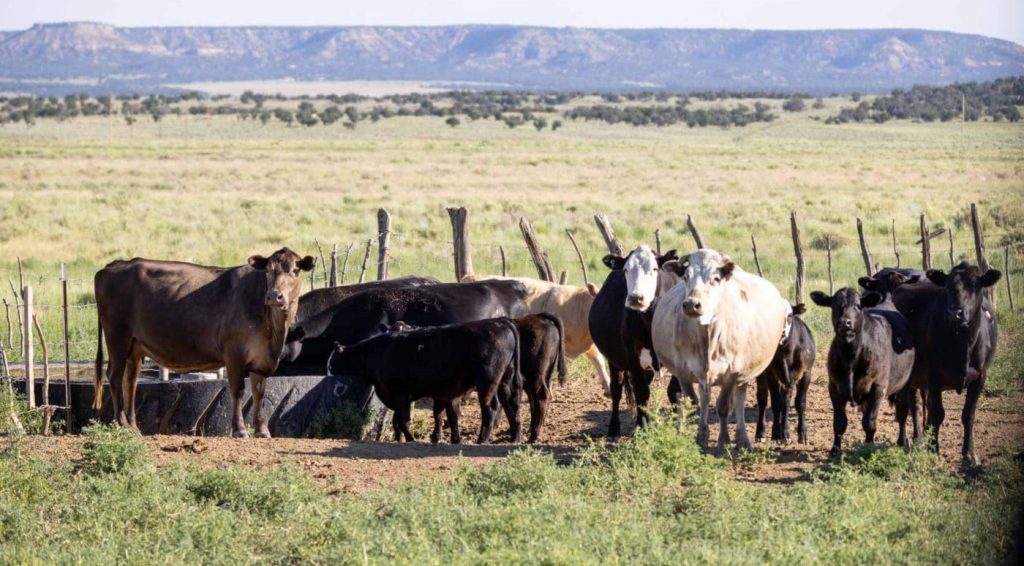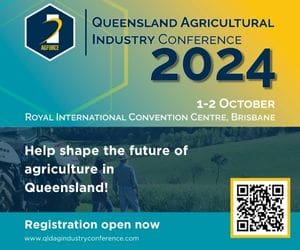
IN two significant climate action developments in the United States, the US Democrats have set a target to reduce the nation’s agriculture emissions to net-zero by 2050, while technology billionaire Jeff Bezos has backed research into livestock vaccines to mitigate methane.
The Democrats’ declaration is part of the party’s 2024 platform released during its recent national convention.
It calls for expanded federal programs to help farmers, ranchers and forest landowners pursue “high-productivity, lower-emission, and generative agricultural practices,” that improve regional food systems.
While they don’t necessary reflect the views of individual candidates, the Democrat and Republican platforms are considered an indication of what party members expect to prioritise in upcoming legislation.
 “Democrats will partner with farmers to make the American agriculture sector the first in the world to achieve net-zero emissions, opening up new sources of income for farmers in the process,” the platform says.
“Democrats will partner with farmers to make the American agriculture sector the first in the world to achieve net-zero emissions, opening up new sources of income for farmers in the process,” the platform says.
It targets greenhouse gas emissions generated by so-called climate super pollutants, including methane, hydrofluorocarbons and nitrous oxide — gasses far more potent and harmful to the environment than carbon dioxide on a per tonne basis.
“Half of today’s climate change is caused by super pollutant greenhouse gases,” the White House said in a press release. “Slashing emissions of these super-pollutants is the fastest way to tackle climate change and a critical complement to reducing carbon dioxide.”
The US also announced US$10 million in funding to advance World Bank efforts reducing ten million tonness of methane from the livestock, rice, waste and sanitation sectors.
Agriculture makes up 35pc of US methane emissions, largely from livestock operations, the Whitehouse said. The Biden administration in 2023 released a methane action plan highlighting the Agriculture Department’s strategies to improve manure management, drive innovation in animal feed and transform more livestock methane emissions into biogas fuel.
The US Government has also committed $13 million in funding to the global Enteric Methane Accelerator, the world’s largest research effort looking for cost-effective solutions to reducing methane that’s released during the animal digestive process.
Bezos backs cattle methane vaccine research
In other recent US sustainability developments, Amazon founder Jeff Bezos, who earlier invested heavily in lab-grown meat, is now investing almost US$10 million (A$14m) into research looking for a vaccine to reduce methane emissions from cattle.
The Bezos Earth Fund is backing a pioneering collaboration between the Pirbright Institute and the Royal Veterinary College aiming to significantly reduce methane emissions from cattle by exploring interventions including the viability of a new vaccine.
“This groundbreaking research explores whether a moonshot to cut livestock methane emissions is achievable,” said Dr Andrew Steer, president and chief executive of the Bezos Earth Fund.
“Vaccines have proven to be incredibly effective in global human health, and if we can apply this approach to cattle, the potential for reducing emissions is immense. The Bezos Earth Fund is committed to high-risk, high-reward projects like this, which have the power to transform our efforts against climate change,” Dr Steer said.
The project proposes to use state-of the-art biotechnology to figure out the mechanism by which a vaccine could cut livestock methane emissions by more than 30pc, addressing a major contributor to climate change.
“Livestock are a primary source of methane, a potent greenhouse gas with a significant impact on climate change,” the Bezos Earth Fund says.
Together with the Global Methane Hub, the funds has a portfolio of grants looking to reduce these emissions through low-methane genetics, improved feed, and better ranch management practices.
“All of these approaches can play a role in specific geographies and ranch-types,” it said, “however, a vaccine offers a universal solution which is both scalable and cost effective, integrating seamlessly into existing farm management systems.”
The project comprises two main components, each tackling different aspects of the challenge:
Early Development of Immune Response: Researchers at the Royal Veterinary College, in collaboration with Consejo Superior de Investigaciones Científicas (CSIC), will study how and when methane-producing microbes (methanogens) colonise the digestive tract of calves and how the immune system responds. Advanced techniques such as multi-omics, histology, and immunology will be used to gain insights into these early interactions. They will also develop methanogens with fluorescent markers to track microbial interactions.
Antibody Response and Vaccine Development: Scientists from the Pirbright Institute and AgResearch NZ will identify and characterise specific antibodies needed to target methanogens effectively. This involves isolating antibodies from immunised cattle and testing their effectiveness in lab conditions. By driving cross-reactive antibody responses and generating panels of antibodies, researchers aim to establish a proof of concept for a methane vaccine.
The project aims to overcome significant scientific hurdles, providing a foundation for a global methane vaccine initiative, the Bezos Earth Fund said.
“If successful, this could revolutionise the way methane emissions are managed in agriculture, offering a viable solution to one of the largest sources of greenhouse gases.”
“We’re not developing a methane vaccine per se – but rather, defining what a successful vaccine needs to achieve. By understanding the precise antibody responses required, we can provide a clear path forward for vaccine development,” said Prof John Hammond, Immunogenetics Group Leader at Pirbright Institute.
“This approach reduces the trial-and-error aspect and focuses on targeted, high-resolution immunology.”
Current knowledge gaps include understanding how antibodies inhibit methanogen growth, identifying effective vaccine-induced antibodies, and determining specific methanogen surface antigens. By addressing these gaps, the project aims to guide the development of an effective methane vaccine.
“Understanding the early colonization of methanogens and the immune response is crucial,” said Dr Dirk Werling, Professor of Molecular Immunology at RVC. “Our work aims to provide the foundational knowledge needed to develop effective interventions. By combining our efforts with Pirbright and CSIC, we’re making strides toward a sustainable solution.”
By supporting this pioneering research, the Bezos Earth Fund is taking a step toward innovative solutions for climate change. The project represents a high-risk, high-reward venture that could lead to planetary-level impacts if successful.
“The potential success of this vaccine could lead to a monumental shift in emissions reduction, demonstrating the power of targeted scientific research in addressing global environmental challenges,” the Fund said.
Mr Bezos’ Earth Fund has committed US$10 billion to projects designed to help protect nature and address climate change.
